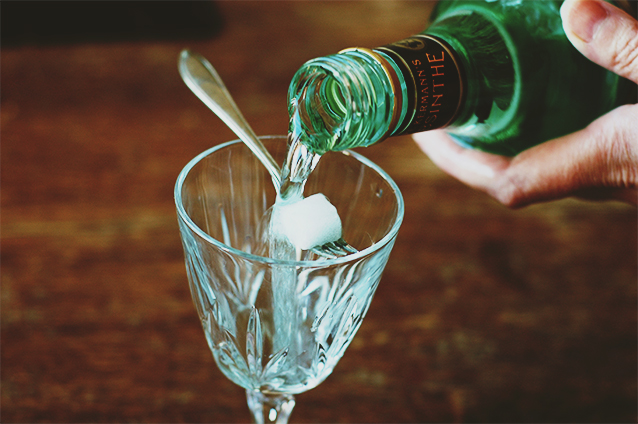
:max_bytes(150000):strip_icc()/absinthe-drip_720x720-6392d9c532b44c8fa7f75f077ce19d33.jpg)
"I find most people can't handle absinthe at its full strength, but really enjoy the flavor profile once it's been diluted down." "Adding sugar and water to absinthe brings out the botanical and sweet notes while making the very high-proof liquor easier to consume," says O'Connor. Cold water is poured over the sugar cube, leading it to slowly dissolve into the absinthe in a process called l ouching, where a high-proof spirit thickens slightly and turns cloudy with the addition of water. Despite its versatility in mixed drinks, O'Connor says he enjoys sipping absinthe in the Parisian style, also known as the absinthe drip, in which a sugar cube is placed on a flat slotted spoon that is balanced over the glass of absinthe.

Nicolas O'Connor, Beverage Director of NYC's Apotheke NoMad, is such a fan of absinthe that he curated a dedicated list to the spirit, and includes it in multiple of the bar's most inventive cocktails. Traditionally, absinthe is not bottled with added sugar, making it a high-proof spirit instead of a sweetened liqueur,which gives absinthe its sharp, harsh flavor.Ībsinthe's botanical notes bring a delicious and distinctive flavor to any cocktail in which it's used, but there are a few traditional ways of enjoying it that really show off its unique qualities. In small quantities, like in a few servings of absinthe, thujone is totally harmless. Wormwood, or Artemisia absinthium, contains a chemical called thujone, which when consumed in large quantities can act as a convulsant. Its signature bitter anise flavor comes from a mix of herbs including fennel and most notably, wormwood, a bitter herb notorious for both its health benefits and supposed hallucinogenic properties. "The elixir was invented in Switzerland as a general cure-all by Pierre Ordinaire, a French physician, in 1792," writes Paul Harrington and Laura Moorhead in their book Cocktail: The Drinks Bible for the 21st Century. It is made from medicinal and culinary herbs, plants, and flowers steeped in high-proof spirits. Absinthe is an overproof liquor, meaning it is a spirit whose ABV (alcohol by volume) is over 50%.


 0 kommentar(er)
0 kommentar(er)
